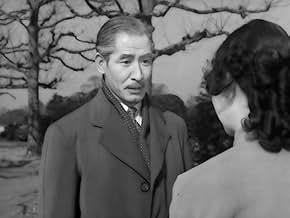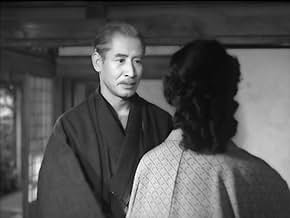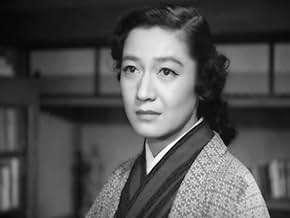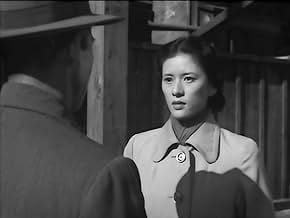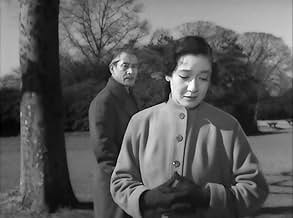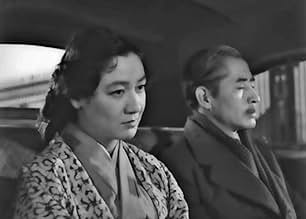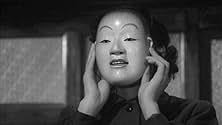ÉVALUATION IMDb
7,7/10
2,2 k
MA NOTE
Ajouter une intrigue dans votre langueAn ingratiating bride develops warm ties to her father-in-law while her cold husband blithely slights her for another woman.An ingratiating bride develops warm ties to her father-in-law while her cold husband blithely slights her for another woman.An ingratiating bride develops warm ties to her father-in-law while her cold husband blithely slights her for another woman.
- Prix
- 1 victoire et 1 nomination au total
Histoire
Le saviez-vous
- AnecdotesSô Yamamura, who portrays Shingo the father, was actually one year younger than Ken Uehara, who portrayed his son Shuichi.
- Citations
Fusako Aihara: What do you think, Father? You're busy reading the newspaper. Nobody really cares about my troubles.
Shingo Ogata: I don't know what to say. From the outside, you can never tell what's really going on in a marriage.
Commentaire en vedette
An honest look at marriage, adultery, divorce, and abortion, especially refreshing for 1954, and with the emotions between an elderly man (So Yamamura) and his daughter-in-law (Setsuko Hara) poignantly rendered. His son / her husband (Ken Uehara) is a real piece of work, brazenly carrying on with other women, staying out late, and getting physically abusive when they don't do as he wishes (referred to, not shown). Meanwhile the man's daughter is also in a broken marriage, returning home with her two children because her husband's cheating on her. The film calls out bad male behavior by showing its impact, and the conversations between characters feels fairly modern.
One of the things altered relative to Yasunari Kawabata's novel is the elderly man's mental state, which in this adaptation isn't declining with age, with accompanying melancholy. Another is his relationship with his daughter-in-law; clearly they have a connection in the film, but it's based on simple kindness and admiration, and erotic feelings on his part aren't involved. The result is a character who is on the surface a decent old man, still married to his own wife despite his own indiscretions and having been more attracted to her older sister long ago. He's not particularly effective in reining in his son, however, and he doesn't give his own daughter enough affection or attention, reserving those things for his daughter-in-law. In that sense he's failed in life.
As in many of her films, Setsuko Hara is the brightest light in the cast. Her character is simple, kind, and filial (derisively referred to as "childlike" by her husband), but shows a toughness in the actions she takes. Hara brings out the emotions very well, and while the ending gets a little melodramatic, it has power. Overall, just a very well done, well-paced film from Mikio Naruse.
One of the things altered relative to Yasunari Kawabata's novel is the elderly man's mental state, which in this adaptation isn't declining with age, with accompanying melancholy. Another is his relationship with his daughter-in-law; clearly they have a connection in the film, but it's based on simple kindness and admiration, and erotic feelings on his part aren't involved. The result is a character who is on the surface a decent old man, still married to his own wife despite his own indiscretions and having been more attracted to her older sister long ago. He's not particularly effective in reining in his son, however, and he doesn't give his own daughter enough affection or attention, reserving those things for his daughter-in-law. In that sense he's failed in life.
As in many of her films, Setsuko Hara is the brightest light in the cast. Her character is simple, kind, and filial (derisively referred to as "childlike" by her husband), but shows a toughness in the actions she takes. Hara brings out the emotions very well, and while the ending gets a little melodramatic, it has power. Overall, just a very well done, well-paced film from Mikio Naruse.
- gbill-74877
- 28 sept. 2021
- Lien permanent
Meilleurs choix
Connectez-vous pour évaluer et surveiller les recommandations personnalisées
Détails
- Date de sortie
- Pays d’origine
- Langue
- Aussi connu sous le nom de
- Sound of the Mountain
- société de production
- Consultez plus de crédits d'entreprise sur IMDbPro
- Durée1 heure 35 minutes
- Couleur
- Mixage
- Rapport de forme
- 1.37 : 1
Contribuer à cette page
Suggérer une modification ou ajouter du contenu manquant

Lacune principale
By what name was Yama no oto (1954) officially released in India in English?
Répondre
